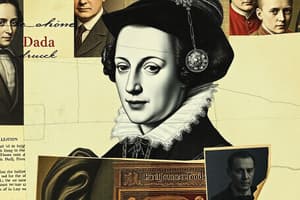Podcast
Questions and Answers
What term describes words borrowed from other languages?
What term describes words borrowed from other languages?
- Dialects
- Neologisms
- Archaisms
- Loanwords (correct)
Which playwright is credited with significantly shaping Early Modern English?
Which playwright is credited with significantly shaping Early Modern English?
- William Shakespeare (correct)
- John Milton
- Ben Jonson
- Christopher Marlowe
What is the definition of 'code-switching'?
What is the definition of 'code-switching'?
- The process of learning a second language
- Changing writing styles within a text
- The simplification of language over time
- Switching between different languages or dialects in conversation (correct)
Which event is recognized as the starting point of the Early Modern English period?
Which event is recognized as the starting point of the Early Modern English period?
What feature primarily distinguishes Modern English from its predecessors?
What feature primarily distinguishes Modern English from its predecessors?
What was a major consequence of the Industrial Revolution on the English language?
What was a major consequence of the Industrial Revolution on the English language?
What is meant by 'English as a Lingua Franca'?
What is meant by 'English as a Lingua Franca'?
Which linguistic feature was lost from Old English to Middle English?
Which linguistic feature was lost from Old English to Middle English?
What does 'diglossia' refer to in linguistics?
What does 'diglossia' refer to in linguistics?
Which movement emphasized the study and preservation of regional dialects in England?
Which movement emphasized the study and preservation of regional dialects in England?
Which Germanic language is distinguished by its vowel change system known as umlaut?
Which Germanic language is distinguished by its vowel change system known as umlaut?
What term describes the significant historical change from Proto-Germanic to its daughter languages?
What term describes the significant historical change from Proto-Germanic to its daughter languages?
What was one impact of colonization on the English language?
What was one impact of colonization on the English language?
Which characteristic defines weak verbs in Germanic languages?
Which characteristic defines weak verbs in Germanic languages?
Which term describes a language that develops from a mixture of different languages and becomes stable over time?
Which term describes a language that develops from a mixture of different languages and becomes stable over time?
What is a notable feature of vocabulary in Germanic languages?
What is a notable feature of vocabulary in Germanic languages?
The term 'Old Norse' refers to which group's influence on Old English?
The term 'Old Norse' refers to which group's influence on Old English?
What does 'semantic shift' refer to in linguistics?
What does 'semantic shift' refer to in linguistics?
In which family of Germanic languages is Icelandic categorized?
In which family of Germanic languages is Icelandic categorized?
Which historical document first standardized some aspects of English spelling and grammar?
Which historical document first standardized some aspects of English spelling and grammar?
What characteristic is common in word formation within Germanic languages?
What characteristic is common in word formation within Germanic languages?
Which region's dialect significantly influenced American English?
Which region's dialect significantly influenced American English?
Which language is part of the West Germanic group?
Which language is part of the West Germanic group?
What is a defining trait of North Germanic languages?
What is a defining trait of North Germanic languages?
Which language has retained many archaic features from Old Norse?
Which language has retained many archaic features from Old Norse?
What type of language structure do most modern Germanic languages exhibit?
What type of language structure do most modern Germanic languages exhibit?
What is a common syntactic feature across most Germanic languages?
What is a common syntactic feature across most Germanic languages?
In terms of phonetics, what is a notable characteristic shared by many Germanic languages?
In terms of phonetics, what is a notable characteristic shared by many Germanic languages?
Which language family does Yiddish belong to within the Germanic branch?
Which language family does Yiddish belong to within the Germanic branch?
What is "Verner's Law"?
What is "Verner's Law"?
Which linguistic phenomenon involves significant borrowing between neighboring languages, often leading to lexical similarities?
Which linguistic phenomenon involves significant borrowing between neighboring languages, often leading to lexical similarities?
What aspect differentiates strong verbs from weak verbs in Germanic languages?
What aspect differentiates strong verbs from weak verbs in Germanic languages?
Which word reflects the Great Vowel Shift?
Which word reflects the Great Vowel Shift?
In Early New English, which consonant sound often became silent?
In Early New English, which consonant sound often became silent?
What was a common feature of unstressed vowels in Early New English?
What was a common feature of unstressed vowels in Early New English?
How did the pronunciation of 'th' sounds change in Early New English?
How did the pronunciation of 'th' sounds change in Early New English?
Which grammatical feature was commonly simplified during Early New English?
Which grammatical feature was commonly simplified during Early New English?
Which pronoun was commonly used in Early New English?
Which pronoun was commonly used in Early New English?
What change occurred to plural noun forms in Early New English?
What change occurred to plural noun forms in Early New English?
What happened to the definite article 'the' in Early New English?
What happened to the definite article 'the' in Early New English?
What is a common characteristic of Indian English?
What is a common characteristic of Indian English?
Which country officially recognizes multiple indigenous languages alongside English?
Which country officially recognizes multiple indigenous languages alongside English?
Which form of English is rhotic, pronouncing the 'r' sound at the end of words?
Which form of English is rhotic, pronouncing the 'r' sound at the end of words?
What is the official dictionary for Australian English?
What is the official dictionary for Australian English?
What term is commonly used in Canadian English for a public holiday?
What term is commonly used in Canadian English for a public holiday?
What is one significant factor influencing Singaporean English?
What is one significant factor influencing Singaporean English?
Which variety of English includes terms like 'bushwalking' and 'mate'?
Which variety of English includes terms like 'bushwalking' and 'mate'?
Which variant of English has integrated Maori words like 'haka' and 'kia ora'?
Which variant of English has integrated Maori words like 'haka' and 'kia ora'?
Flashcards
Loanwords
Loanwords
Words borrowed from other languages. They are often adopted due to cultural exchange or the need to express new concepts.
Code-switching
Code-switching
The act of switching between different languages or dialects within a conversation.
Early Modern English period
Early Modern English period
This period in English began with the invention of the printing press and saw significant changes in language, including the standardization of spelling and grammar.
Dialect
Dialect
Signup and view all the flashcards
English as a Lingua Franca
English as a Lingua Franca
Signup and view all the flashcards
Middle English period
Middle English period
Signup and view all the flashcards
Loss of Inflectional Endings
Loss of Inflectional Endings
Signup and view all the flashcards
Shakespeare's neologisms
Shakespeare's neologisms
Signup and view all the flashcards
What is diglossia?
What is diglossia?
Signup and view all the flashcards
What is the Linguistic Revival Movement?
What is the Linguistic Revival Movement?
Signup and view all the flashcards
What is a Creole language?
What is a Creole language?
Signup and view all the flashcards
What is Ebonics?
What is Ebonics?
Signup and view all the flashcards
What is semantic shift?
What is semantic shift?
Signup and view all the flashcards
What is neologism?
What is neologism?
Signup and view all the flashcards
What does "Old Norse" refer to?
What does "Old Norse" refer to?
Signup and view all the flashcards
What document standardized aspects of English spelling and grammar?
What document standardized aspects of English spelling and grammar?
Signup and view all the flashcards
Grimm's Law
Grimm's Law
Signup and view all the flashcards
North Germanic
North Germanic
Signup and view all the flashcards
Compounding
Compounding
Signup and view all the flashcards
Umlaut
Umlaut
Signup and view all the flashcards
Weak Verbs
Weak Verbs
Signup and view all the flashcards
Native Words
Native Words
Signup and view all the flashcards
West Germanic
West Germanic
Signup and view all the flashcards
Language change
Language change
Signup and view all the flashcards
Monophthongization
Monophthongization
Signup and view all the flashcards
Diphthong Reduction
Diphthong Reduction
Signup and view all the flashcards
The Great Vowel Shift
The Great Vowel Shift
Signup and view all the flashcards
Schwa Pronunciation in Early New English
Schwa Pronunciation in Early New English
Signup and view all the flashcards
Loss of Case Endings
Loss of Case Endings
Signup and view all the flashcards
Change in "th" Pronunciation
Change in "th" Pronunciation
Signup and view all the flashcards
SVO Word Order in Early New English
SVO Word Order in Early New English
Signup and view all the flashcards
Elimination of -en Plural
Elimination of -en Plural
Signup and view all the flashcards
Which modern Germanic language is closest to Old Norse?
Which modern Germanic language is closest to Old Norse?
Signup and view all the flashcards
What is the typical word order in modern Germanic languages?
What is the typical word order in modern Germanic languages?
Signup and view all the flashcards
Which Germanic branch does Yiddish belong to?
Which Germanic branch does Yiddish belong to?
Signup and view all the flashcards
What is Verner's Law?
What is Verner's Law?
Signup and view all the flashcards
What is a pidgin language?
What is a pidgin language?
Signup and view all the flashcards
What is a major impact of Viking invasions on the English language?
What is a major impact of Viking invasions on the English language?
Signup and view all the flashcards
Which Germanic language has undergone major vowel shifts?
Which Germanic language has undergone major vowel shifts?
Signup and view all the flashcards
What differentiates strong verbs from weak verbs in Germanic languages?
What differentiates strong verbs from weak verbs in Germanic languages?
Signup and view all the flashcards
What is a common characteristic of Indian English?
What is a common characteristic of Indian English?
Signup and view all the flashcards
Which country officially recognizes multiple indigenous languages alongside English?
Which country officially recognizes multiple indigenous languages alongside English?
Signup and view all the flashcards
Which form of English is rhotic (pronounces the 'r' sound at the end of words)?
Which form of English is rhotic (pronounces the 'r' sound at the end of words)?
Signup and view all the flashcards
What is the official dictionary for Australian English?
What is the official dictionary for Australian English?
Signup and view all the flashcards
What term is commonly used in Canadian English for a public holiday?
What term is commonly used in Canadian English for a public holiday?
Signup and view all the flashcards
What is one significant factor influencing Singaporean English?
What is one significant factor influencing Singaporean English?
Signup and view all the flashcards
What is a distinctive feature of Jamaican English?
What is a distinctive feature of Jamaican English?
Signup and view all the flashcards
Which variety of English is most widely used in academia and international organizations?
Which variety of English is most widely used in academia and international organizations?
Signup and view all the flashcards
Study Notes
English Language History and Development
- Earliest form of English: Old English
- Group credited with bringing Old English to Britain: Anglo-Saxons
- Significant event in 1066 that affected English: The Norman Conquest
- Language that significantly influenced Middle English: French
- Primary characteristic of Middle English: Extensive use of French vocabulary
- Famous Middle English work: "The Canterbury Tales"
English Language Periods
- Period characterized by significant vocabulary increase from Latin and Greek: Early Modern English
- Person known for standardizing English spelling and grammar in the 18th century: Samuel Johnson
- Primary language family English belongs to: Germanic
- Feature of Old English: Strongly inflected nouns and verbs
- Event marking the beginning of the Early Modern English period: The invention of the printing press
- Linguistic feature distinguishing Modern English from its predecessors: Fixed word order
English Dialects and Varieties
- Dialect of English considered the basis for Standard English: Received Pronunciation (RP)
- Term referring to a simplified language developing between speakers of different native languages: Pidgin
- Term describing words borrowed from other languages: Loanwords
- Term referring to a language variety with distinct features but still mutually intelligible: Dialect
- Major linguistic change during the transition from Old to Middle English: Loss of case endings in nouns
English Language Evolution
- Event that significantly contributed to changing English vocabulary: Industrial Revolution
- Reason for the rapid expansion of English vocabulary: Globalization and technology
- Event marking the beginning of the Early Modern English period: The Norman Conquest
- Event causing the influx of Latin and Greek words into English: The Renaissance
- Term for a language that develops from a mixture of different languages: Creole
Influence on English
- Reason for the limited documentation of East Germanic languages: They were primarily oral languages and not written down or not well preserved.
- Major influence on the development of English as a global lingua franca: Colonial expansion and trade
- Feature that distinguishes Germanic languages from other Indo-European languages: Strong and weak verb distinctions
Other Key Points
- Defining characteristic of North Germanic languages: Absence of a case system.
- Notable sound change in Early Germanic languages: Grimm's Law
- Feature of Germanic languages: Extensive use of native words
- Vowel shift in Old English that notably changed the pronunciation of vowels: The Great Vowel Shift
- Significant role in the fall of the Western Roman Empire: The Huns
- Major historical event for the Goths: The sack of Rome in 410 AD
- Language that was spoken by the Vandals: Vandalic
- Famous historical figure associated with Gothic conflicts with Rome: Attila the Hun
- Influence that significantly impacted English: The Norman conquest and the Viking invasions
- Feature influencing English: borrowed words from Latin, Greek and French
- Language group that Gothic belongs to: East Germanic
Additional Notes
- Includes additional specific questions (e.g., regarding vowel shifts, consonant changes, and grammatical features).
- Important dates and events are indicated for proper historical perspective
- Covers the development of English from Old English to Modern English, highlighting key linguistic features and influences, regional variations, and modern usages.
- Includes information about the major differences between East and West Germanic languages.
Studying That Suits You
Use AI to generate personalized quizzes and flashcards to suit your learning preferences.




